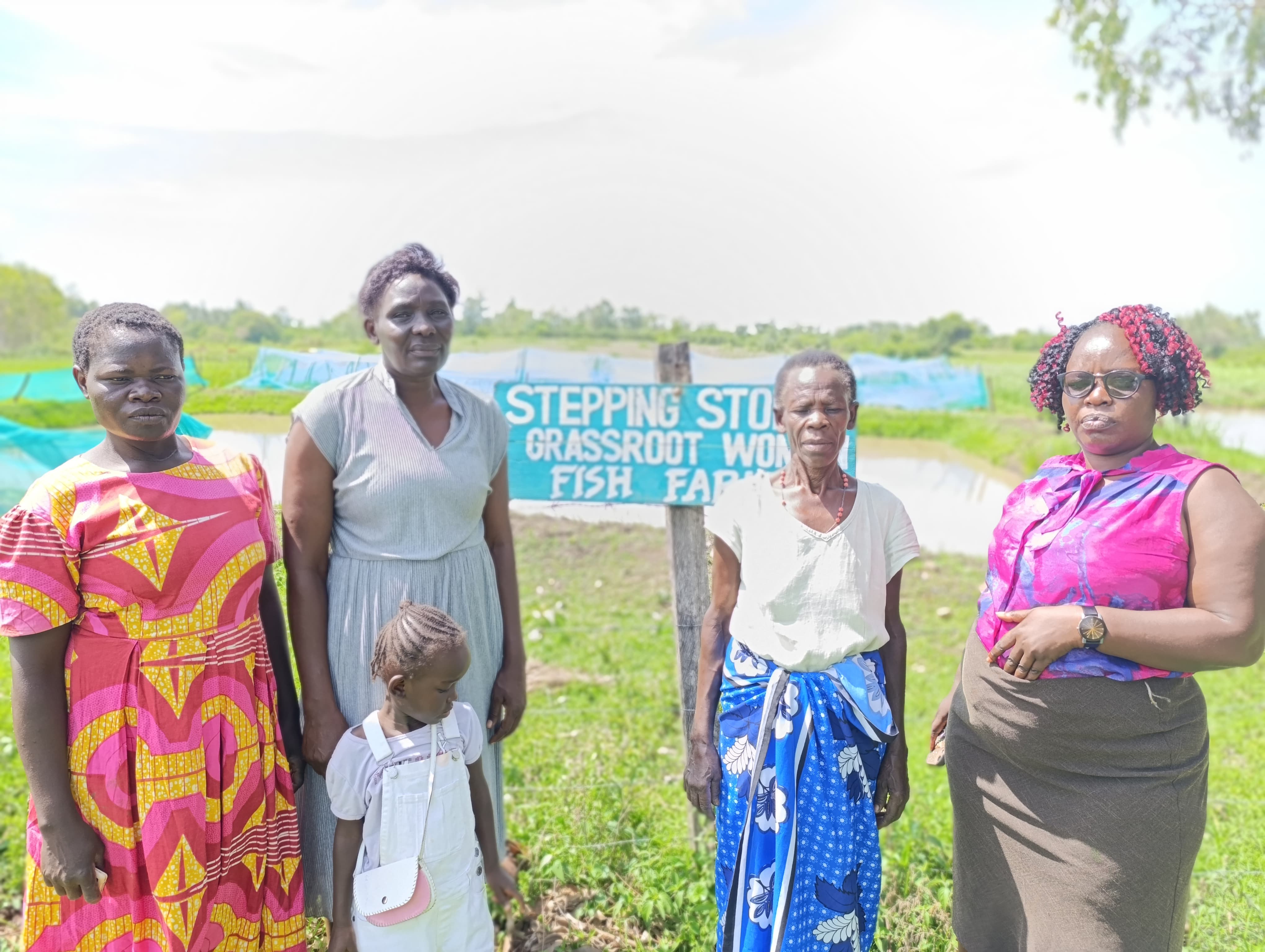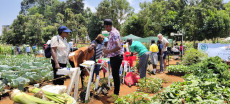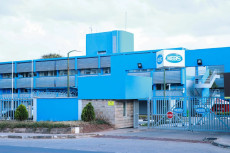- For women who have suffered rejection, stigma, and the emotional toll of living with HIV, the Stepping Stone Women Group has become more than a support group.
Deep in the heart of Pala village in Rachuonyo North Sub-county, Homa Bay County, a quiet revolution is changing the lives of HIV-positive women—one voice, one story, one step at a time.
For women who have suffered rejection, stigma, and the emotional toll of living with HIV, the Stepping Stone Women Group has become more than a support group.
It is a lifeline daring to give HIV-infected women dignity, a voice, and a second chance at life in a world that once turned its back on them under the cruel weight of discrimination simply for living with the virus.
Founded in 2009 by three HIV-positive women, the group was born out of shared pain, rejection and a burning desire to speak about matters surrounding HIV-related stigma.
Today, the story of Esther Adhiambo, the last remaining founder of the group, echoes the agony and resilience of many like her who have been silenced by shame and emotionally wounded by stigma.
Read More
The fierce advocate, who has turned her pain into power, continues to fight for dignity and a voice for women like her as she leads her peers in rewriting the narrative for women living with HIV in Pala village at the shores of Lake Victoria.
Esther was diagnosed in 2008 while pregnant with her third child. Her diagnosis tore apart her home when her husband tested negative. Her husband rejected her and remarried, leaving Esther abandoned and stigmatized.
“I never accepted the first results,” Esther recalls, “but when I could no longer hide the symptoms, everything changed. I was left alone, judged, and blamed by those I loved most. My situation worsened, I became wasted and almost died from lack of proper care.”
Despite her deep wounds, the Stepping Stone Women's Group has made significant strides in providing safe spaces and advocating for better healthcare access and economic empowerment for Esther and her peers.
“Through fish farming initiatives, the group is helping members escape the exploitative cycle of “sex for fish,” a desperate trade that has exposed many of us to HIV due to lack of economic empowerment,” Esther says.
The group become a fortress and an oasis of hope for many infected women and girls. They are no longer just surviving but also thriving as young girls born of the virus are getting educated and empowered, and their demand for dignity is being heard.
“This space not only focuses on women, as young mothers and teen girls are also finding healing here. They are learning to nurture their bodies, care for their children, and access to life-saving medication without fear or shame,” Esther affirms with pride.
For Joice Atieno, a widowed mother living with HIV, Stepping Stone has become her sanctuary. Forsaken by her immediate family for having the virus, Joice found solace in the women's group.
“I came broken and scared. I was young with no idea of what this virus was. My family considered me an outcast, but Stepping Stone gave me the hope to fight for my voice.” Joice shares, “Now, I have sisters who understand me, who lift me up, and most importantly, my children are educated.”
Stepping Stone also opens its doors for discordant couples battling domestic stigma. Phelister Ondiek, whose husband is HIV-positive, shares how the group taught her how to care for him emotionally and physically.
“This group has taught me that love does not end with a diagnosis. I have learnt care, medication process and emotional availability for my partner. This group has given me strength and knowledge on HIV,” she says.
Kenya reported its first HIV/AIDS case 40 years ago, and since then, the pandemic has robbed many of their social life following the rapid infections and increase in stigmatization.
A report by the former Health Cabinet Secretary Dr Debora Barasa on World AIDS Day 2024, revealed that 1,378,457 Kenyans are living with HIV, a prevalence rate of 3.3%.
The National Syndemic Diseases Control Council progress report for 2024 revealed that females accounted for 4.5% compared to males and 2.2 % of the infections, with 106,003 people living with HIV in Homa Bay County alone.
Kenya has made significant progress through awareness and medical advancements in the past decades, and new infections have declined from 101,448 in 2013 to 16,752 in 2023.
Despite the supportive environment Stepping Stone provides, stigma still silences many, making it difficult for some women to embrace their status as they continue navigating personal acceptance openly.
“Recruiting new members is still a challenge. Self-stigma is still a nightmare for most women.” Esther explains, “They are afraid of coming out clean about their status even to be part of a group created just for them. The silence and fear is what continues to kill.”
Benta Adhiambo, a Community Health Promoter at Makongeni dispensary in Homa Bay town, has been living with the virus for the past 23 years.
“Unlike women who are outspoken, men suffer stigma more than women because they hardly open up about their status, and often times they do not come for drugs which forces us to do defaulter tracing to reverse effects,” Benta says.
In the attempt to offer mental health support for people undergoing stigma, follow-ups are made to reach out to those suspected to be undergoing stigma so that they get appropriate counselling.
“It is our role to ensure our patients are in the right mental state, many times we plan follow ups with them for counselling to ensure they are up to date with their medication and they are mentally stable,” Benta highlights.
According to her, stigma has evolved over the years, from total isolation and people hiding their medical cards to people speaking boldly about their status, creating awareness and teaching each other about safety precautions.
“The kind of stigma I felt as a positive CHP cannot match the one today. A lot of awareness has been done; people are showing up for tests and taking charge of their status. Stigma still exists but in most cases it is always self-stigma.”
Benta shares that as a CHP, self-stigma has led to people defaulting on drugs, but the efforts to help them get back on track and overcome self-stigma and denial have helped many to battle the virus.
These efforts now face a critical setback following the withdrawal of USAID financial and medical support for HIV/AIDS programs in Kenya. They could jeopardize efforts towards reducing new cases to below 1,000 by 2030.
“Nobody knows what will happened post the grace period President Trump issued. As Stepping Stone we are urging our members to ensure their ARVs bottles are refilled following the uncertainty that will manifest after the proposed 90 days,” Esther says with worry in her face.
Dr. Laibon-Masha Ruth, the CEO of the National Syndemic Diseases Control Council (NSDCC), confirmed that USAID has been funding Kenya for the past 60 years, with Kenya receiving Ksh. 1.26 trillion between 2001 and 2024, ranking 5th globally as a funding beneficiary.
This funding has been facilitating peer-led services, including community-led monitoring and community-based HIV prevention outreach programs. Benta affirms that without the outreach programs, sensitization and stigma reduction will be jeopardized.
“As CHPs we have been doing community outreaches ensuring that prevention and treatment as well as counselling services reach grass root level. However with USAID services withdrawn, lack of treatment and mental support are going to fuel stigma,” Benta shares.
As a beneficiary of USAID funding, the Stepping Stone women's group has received treatment and counselling that has kept the women in good health; discordant couples, on the other hand, have often received mental health support, care and prevention of the spread of the virus.
Esther sends a plea to President Trump to reconsider his move on the stopped funding and withdrawal of key services, saying it is a threat to every life that lives with the virus.
"I'm terrified for my people. If President Trump does not reverse the funding cuts before the 90-day window closes, many of us will die," Esther says, her voice heavy with fear. "We’ve come so far, those funds kept our medication flowing. Without them, lives will be lost.”












